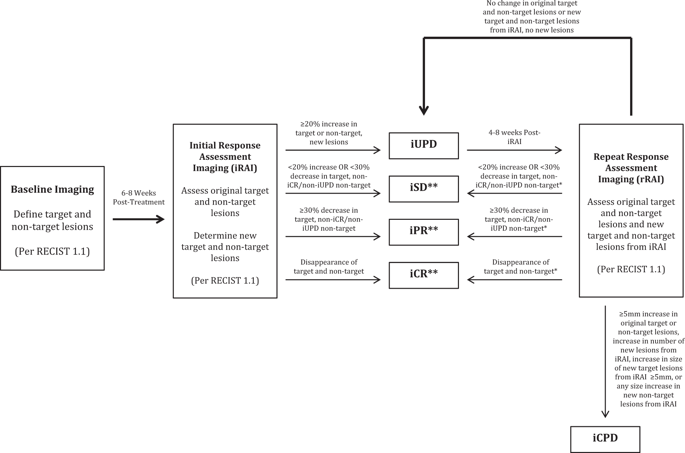Cancer Gene Therapy ( IF 6.4 ) Pub Date : 2019-12-11 , DOI: 10.1038/s41417-019-0155-1 Louis F Chai 1, 2 , Ethan Prince 3 , Venu G Pillarisetty 4 , Steven C Katz 1, 2

|
With the advent of immunotherapy as an integral component of multidisciplinary solid tumor treatment, we are confronted by an unfamiliar and novel pattern of radiographic responses to treatment. Enlargement of tumors or even new lesions may not represent progression, but rather reflect what will ultimately evolve into a clinically beneficial response. In addition, the kinetics of radiographic changes in response to immunotherapy treatments may be distinct from what has been observed with cytotoxic chemotherapy and radiation. The phenomenon of pseudoprogression has been documented in patients receiving immunotherapeutic agents, such as checkpoint inhibitors and cellular therapies. Currently, there are no clinical response guidelines that adequately account for pseudoprogression and solid tumor responses to immunotherapy in general. Even so, response criteria have evolved to account for the radiographic manifestations of novel therapies. The evolution of World Health Organization (WHO) criteria and Response Evaluation Criteria in Solid Tumors (RECIST), along with the emergence of immune-related response criteria (irRC) and the immune Response Evaluation Criteria in Solid Tumors (iRECIST) reflect the need for new frameworks. This review evaluates the relationship between pseudoprogression, clinical outcomes, and our current understanding of the biology of pseudoprogression. To achieve our goal, we discuss unusual response patterns in patients receiving immunotherapy. We seek to develop a deeper understanding of radiographic responses to immunotherapy such that clinical benefit is not underappreciated in individual patients and during clinical investigation.
中文翻译:

评估实体瘤对免疫疗法的反应的挑战。
随着免疫疗法作为多学科实体瘤治疗不可或缺的组成部分的出现,我们面临着一种不熟悉且新颖的放射学对治疗的反应模式。肿瘤扩大甚至新病变可能并不代表进展,而是反映了最终将演变成临床有益反应的情况。此外,响应免疫治疗的放射学变化的动力学可能与细胞毒性化疗和放射所观察到的不同。在接受免疫治疗药物(如检查点抑制剂和细胞治疗)的患者中已记录到假性进展现象。目前,没有临床反应指南充分说明假性进展和实体瘤对免疫治疗的一般反应。即使是这样,反应标准已经发展到可以解释新疗法的放射学表现。世界卫生组织 (WHO) 标准和实体瘤反应评估标准 (RECIST) 的演变,以及免疫相关反应标准 (irRC) 和实体瘤免疫反应评估标准 (iRECIST) 的出现反映了对新的框架。这篇综述评估了假性进展、临床结果和我们目前对假性进展生物学的理解之间的关系。为了实现我们的目标,我们讨论了接受免疫治疗的患者不寻常的反应模式。我们寻求更深入地了解放射学对免疫疗法的反应,以便在个体患者和临床研究期间不会低估临床益处。



























 京公网安备 11010802027423号
京公网安备 11010802027423号